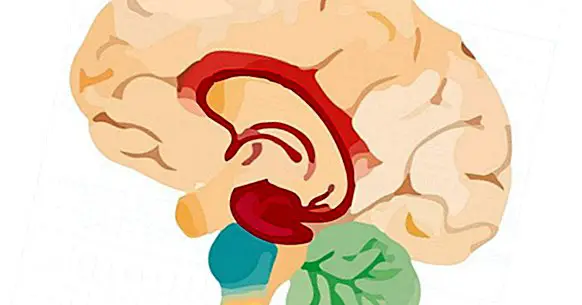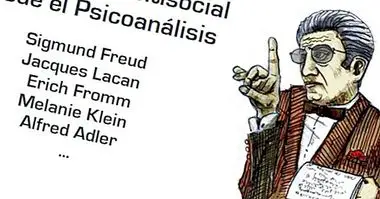Types and causes
Among the clinical pictures associated with different alterations of cognitive activity is the organic brain syndrome. Although it is a term, it has fallen into disuse within some contexts; it is a category specially used to relate psychiatric manifestations to the functioning of organic structures.
In this article we will see what is the organic brain syndrome , what other names are known and what mental and physiological states it refers to.
- Related article: "Parts of the human brain (and functions)"
What is organic brain syndrome?
The Organic Cerebral Syndrome is also known by the following names: organic brain disease, organic brain disorder, an organic mental syndrome or organic mental disorder. It is characterized for being a condition whose cause is related to the physiological structure , more than with pure mental activity (for that reason it is known as an "organic" syndrome).
It is not a specific diagnostic criterion, but rather a general classification, which encompasses a set of clinical manifestations whose common characteristic is that they are caused or related to physical structures.
In other words, there are medical conditions that directly alter the physiological activity of the nervous system. This alteration can be made visible in the behavior, in the state of mind or in the subjective and cognitive experiences (as in their thoughts, beliefs, perceptions, sensations, etc.).
In some cases, the above causes a clinically significant discomfort, so that a psychiatric diagnosis can be resorted to. With the intention of make an evaluation and an intervention that takes into account the physiological elements that may be behind the behaviors or the cognitive activity causing this discomfort, the organic brain syndrome category was created. However, and although it is a concept that has been very frequent within the psychiatric clinic, it has now been subject to some modifications.
- Maybe you're interested: "The 15 most frequent neurological disorders"
Types and causes
Two main types of organic brain syndrome have been recognized, they are distinguished mainly by the time of appearance .
1. Acute
It means that it is a mental state of recent appearance. It may be caused for intoxication or overdose of psychoactive substances, infections and medical diseases that affect the nervous system. They are usually temporary episodes, although they can occur on different occasions. For example, it may be the case of delirium.
2. Chronic
It is about the manifestations that are maintained in the long term. This is usually the case of chronic dependence on psychoactive substances such as drugs or alcohol, whose toxic effects on brain structures can significantly modify neuronal and cognitive functions. Likewise it may be the case of neurodegenerative disorders , different types of dementia or what may happen as a result of cardiovascular accidents.
Origin of the concept and associated symptoms
In the context of modern psychiatry, the term "Cerebral Organ Syndrome" (and its synonyms) was used to differentiate between purely mental etiology, and the etiology was clearly related to physiological functioning. However, with the subsequent knowledge and theories about the functioning of the human mind and its relationship with both brain structures, such a distinction has been increasingly disregarded .
Said in the words of Ganguli, Black, Blazer, et al. (2011) the term "organic" suggested that there was a known brain structure and causing some manifestations. This structure was different from another, which was called "functional" and encompassed all manifestations that had a purely mental etiology.
But, with the development and transformations of cognitive science and neuroscience, psychiatry has rejected the false disconnection between organic and nonorganic functional structures, which ultimately resulted in a distinction between mental and brain manifestations. Currently, psychiatry maintains that the brain (the organic structures) is actually the basis of mental or functional structures .
However, the term Organic Cerebral Syndrome continues to be used as a way to describe states of consciousness and their relationship with different elements and causes of physiological type.As it happens with the medical categories, this last one facilitates the communication among experts, especially those of those who have been trained in the psychiatric tradition where the category of "Cerebral Organ Syndrome" allowed to perform different investigations and clinical approaches .
For example, the journal Rheumatology (cit. In Sciencedirect, 2018), in its sixth version, defines the Organic Cerebral Syndrome as a state of brain dysfunction associated with disturbances of consciousness, cognition, affect or mood ; caused by behavior during drug abstinence; by infections or metabolic causes.
Suggestions from the working group of neurocognitive disorders
For its part, the working group of neurocognitive disorders of the American Psychological Association, which was integrated to form the fifth version of its Statistical Manual of Mental Disorders, has accepted the use of the term "neurocognitive" to refer to clinical manifestations where the mind acts as a result of alterations in the brain. Thus, the classification of "Neurocognitive disorders associated with medical causes" (for example, post-operative neurocognitive dysfunction) emerges.
Broadly speaking, the manifestations that are included in that category are visible in complex attention, learning and memory , executive functions, language, visuoconstructive perception and social cognition).
Bibliographic references:
- ScienceDirect (2018). Organic brain syndrome. Retrieved August 1, 2018. Available at //www.sciencedirect.com/topics/neuroscience/organic-brain-syndrome.
- Wikipedia (2018). Organic brain syndrome. Recueprado 1 of August of 2018. Available in //en.wikipedia.org/wiki/Organic_brain_syndrome.
- Ganguli, M., Blacker, D., Blazer, D. et al. (2011) Classification of Neurocognitive Disorders in DSM-5: A Work in Progress. American Journal of Geriatric Psychiatry. 19 (3): 205-210.
- Chandrasekaran, P., Jambunathan, S. & Zainal (2005). Characteristics of patients with organic brain syndromes: a cross-sectional 2-year old follow-up study in Kuala Lumpur, Malaysia. Annals of General Psychiatry (4) 9. DOI 10.1186 / 1744-859X-4-9.



















